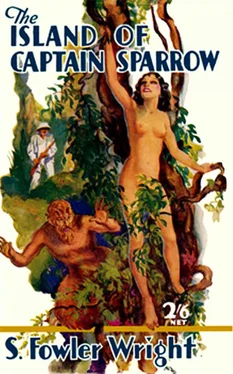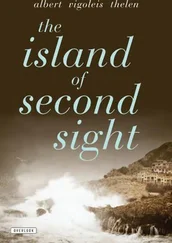Sydney Fowler Wright - The Island of Captain Sparrow
Здесь есть возможность читать онлайн «Sydney Fowler Wright - The Island of Captain Sparrow» — ознакомительный отрывок электронной книги совершенно бесплатно, а после прочтения отрывка купить полную версию. В некоторых случаях можно слушать аудио, скачать через торрент в формате fb2 и присутствует краткое содержание. Жанр: unrecognised, на английском языке. Описание произведения, (предисловие) а так же отзывы посетителей доступны на портале библиотеки ЛибКат.
- Название:The Island of Captain Sparrow
- Автор:
- Жанр:
- Год:неизвестен
- ISBN:нет данных
- Рейтинг книги:4 / 5. Голосов: 1
-
Избранное:Добавить в избранное
- Отзывы:
-
Ваша оценка:
- 80
- 1
- 2
- 3
- 4
- 5
The Island of Captain Sparrow: краткое содержание, описание и аннотация
Предлагаем к чтению аннотацию, описание, краткое содержание или предисловие (зависит от того, что написал сам автор книги «The Island of Captain Sparrow»). Если вы не нашли необходимую информацию о книге — напишите в комментариях, мы постараемся отыскать её.
The Island of Captain Sparrow — читать онлайн ознакомительный отрывок
Ниже представлен текст книги, разбитый по страницам. Система сохранения места последней прочитанной страницы, позволяет с удобством читать онлайн бесплатно книгу «The Island of Captain Sparrow», без необходимости каждый раз заново искать на чём Вы остановились. Поставьте закладку, и сможете в любой момент перейти на страницу, на которой закончили чтение.
Интервал:
Закладка:
CHAPTER I – THE LANDING OF CHARLTON FOYLE
The wind had fallen, but the sky was still black with low and hurrying cloud, and the sea rolled heavily.
Charlton Foyle sat in the stern of the boat, and steered with an oar. He was striving to keep her head before the wind, and gazing anxiously at the land, toward which wind and tide were united to take him.
He saw that the cliff-wall rose straight and high. There was no sign of nearer rocks or shallows. It appeared that the cliff rose abruptly from a deep water. What hope could it give?
He could not handle the boat. There was a mast, but it was not stepped, nor had he strength and skill to set it up, or to control its canvas. There were oars, but they were too heavy, and the boat too large for a single man to manage more than one.
Till the storm came in the night he had let the boat drift as it would. He had water; he had food. He had not known where he was, nor in which direction land might be nearest. His only hope was to be picked up by a passing ship.
For many days the sun shone; and the seas were kind. The indolent, laughing waters had rocked him gently, and in their arms he had regained something of the health which he had sought vainly over half the world. He had begun to care for life, when life seemed most likely to elude him. He was aware that he watched the horizons for lift of sail, or trail of smoke, with a keener vigilance than he had done in the weariness of the first days. But it was still with a mind too indifferent to the future for anxiety to disturb it, unless it were aroused by a danger which should be acute and imminent.
He had leaned lazily over the tossing side of the boat, watching strange life in deep water, or gazed at a sky of white-and-blue, or brilliant with tropic stars.
Once a flock of birds passed, low and swift, over the waves. He did not know their kind. They flew straight and fast, as having a clear goal and a common purpose. Should he make some effort to direct the boat in the same way? Even could he do it, he had doubted its wisdom. He knew nothing of how far such birds may travel. They might be on their way to a near land, or they might be leaving the near land behind them. They passed quickly, and the great loneliness of sky and water was again around him.
Once the wide expanse of solitary sky was specked by a great bird that grew in size as it came more nearly overhead. He realized that it was not merely flying over, but was descending toward him. It was gray in color, larger than a swan, and with broad wings that moved with an occasional powerful stroke. It came low. It circled the boat twice in a narrowing spiral. He saw a long hooked beak, and a dark eye that considered him. He reached for a boat-hook, and was aware that his hand shook as he did so.
Then it came with a rush, close over him. He crouched in the well of the boat, and thrust blindly as it passed.
Because he crouched as he did, the beak missed him. For a second he was under a canopy of feathered wings. The boat-hook caught, and came clear.
He saw the great bird soaring back into the sky. There was a stain of blood on the end of the hook, and some gray feathers floated on the wind, and settled down on the water.
When the wind had risen, he had got out the oar, and striven to keep the boat's head so that she should not be swamped by the waves. He did not know whether his toil had been needless. The boat was large, strongly built, and half-decked. He supposed that the storm had not been a bad one. Certainly not as bad as some he had witnessed from a liner's deck. But the waves had seemed large—there was a difference in the point of view.
Anyway, the wind had fallen again. The black menace of the night, with its heaving waters that came out of the darkness, was over, and he was safe, though wearied—and now the sea was carrying him swiftly toward a peril which he had no means of avoiding, or any hope to overcome. Every moment the cliff-wall showed nearer and higher, as the tide swept the boat forward.
At the rate at which it was moving, it obeyed the steering-oar very readily. He could deflect its course, but he doubted whether this would avail him. It might enable him to delay the final impact, or to strike the land somewhat further north than would otherwise be the case, but it seemed that, soon or late, he must be dashed against a cliff-wall that showed neither beach nor break so far as his eyes, could follow it.
Still, the impulse is instinctive to delay a danger which we can see no means of defeating. The swimmer will remain afloat while his strength lasts, though he may have no hope of rescue. The embarrassed tradesman will strive to renew a bill, though, as he well knows, the later date will give no better prospect of solvency. He leaned on the oar till the boat lay almost broadside to an advancing wave. It rolled in the trough, and some water slopped over the gunwale.
Easing it somewhat, he looked shoreward again as the next wave lifted. The morning sun, which was behind him, and still low in the sky, found a break in the flying cloud, and lighted the cliff-face with a fading glory. But he noticed that there was one spot which remained dark. It was not a break in the wall. It was like a cave-mouth at the tide-level. It gave a hope, though a faint one.
He bent his mind to the task of steering toward it.
As he approached the cliff, he saw that the distant view had not enlarged its terrors. It rose straight as a wall. If his boat were beaten against it by the breaking waves, he knew that disaster must be instant and irretrievable.
It seemed, as he neared it, that the pace of the boat was somewhat less, and that his control upon it increased. He wondered whether he might not be wiser to struggle to avoid the peril entirely. Soon or late, changes of wind and tide would be sure to aid him. But the chance was doubtful. His control of the boat, at the best, was not great. If he should work it some distance from the land, the next tide might fling it back, and there might then be no possibility of refuge.
Now, the opening which he had sought was before him, widening in appearance as he approached, and of such height that a fishing-smack could have run in with its sails set.
He was aided, more than he knew, by the fact that the tide was full, and near the turn; and, more by the tide's caprice than his own skill, he steered to the opening.
The waves that broke on the cliff-wall to right and left made a swirling turmoil of the gap which gave them passage. They rolled the boat till he thought that it would be overset, swept it broadside on, and carried it into a tunnel where it bumped heavily against a wall of rock, recoiled, and the next moment was in somewhat quieter water.
He perceived that the tunnel, though straight in itself, was driven into the cliff obliquely from the sea-line. The cliff faced the east. The tunnel ran north-west. The direct force of the waves did not therefore swing in; yet the boat tossed from side to side, and though he struggled hard with the oar, it got some rough bumps as the waves hurried it inward.
As his eyes became used to the gloom, he saw that the passage ended in a blank wall, against which the water rose and fell restlessly, making a murmurous sound which filled the tunnel. The speed of the boat slackened as he approached it. He shipped the oar and took up the boathook, thinking to fend the boat from the wall of rock which he was nearing. He saw no hope but to remain there and protect the boat as best he might, till the tide should carry him again to the open sea. Then he noticed a heavy iron ring, set in the face of the rock, by which a boat might be moored.
He looked round with an increased wonder and a keener scrutiny. He saw that there were similar rings in the walls on either side. The tunnel had steadily narrowed as it progressed, so that the walls were much nearer than they had been at the entrance. It was evident that a boat moored to the three rings would be secure from being beaten against the rocks. He had abundance of stout cable, and he resolved to fasten it in this manner. He could at least feel that he would not be hurried out to the open sea till he was ready for the adventure.
Читать дальшеИнтервал:
Закладка:
Похожие книги на «The Island of Captain Sparrow»
Представляем Вашему вниманию похожие книги на «The Island of Captain Sparrow» списком для выбора. Мы отобрали схожую по названию и смыслу литературу в надежде предоставить читателям больше вариантов отыскать новые, интересные, ещё непрочитанные произведения.
Обсуждение, отзывы о книге «The Island of Captain Sparrow» и просто собственные мнения читателей. Оставьте ваши комментарии, напишите, что Вы думаете о произведении, его смысле или главных героях. Укажите что конкретно понравилось, а что нет, и почему Вы так считаете.












